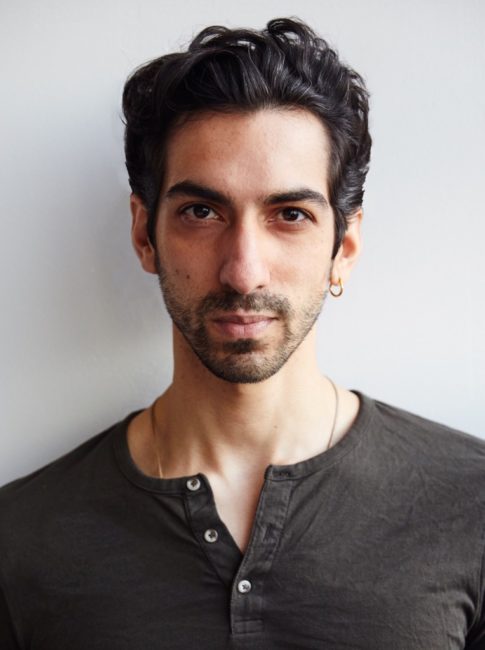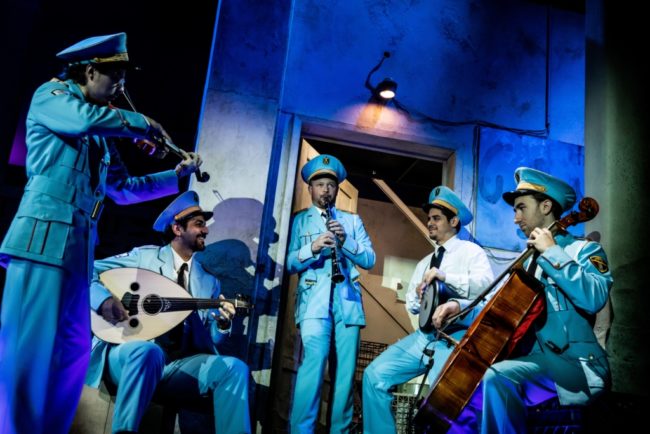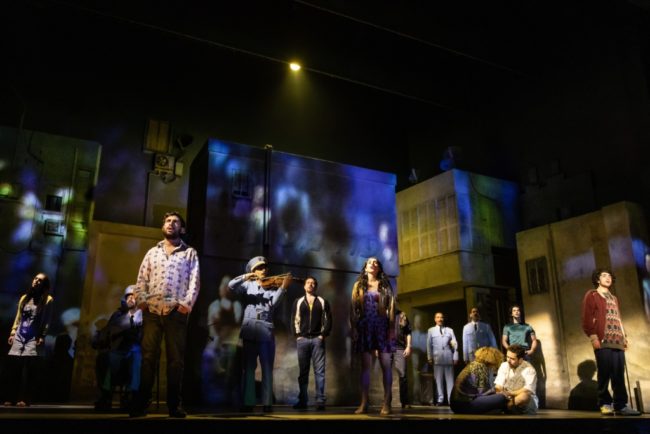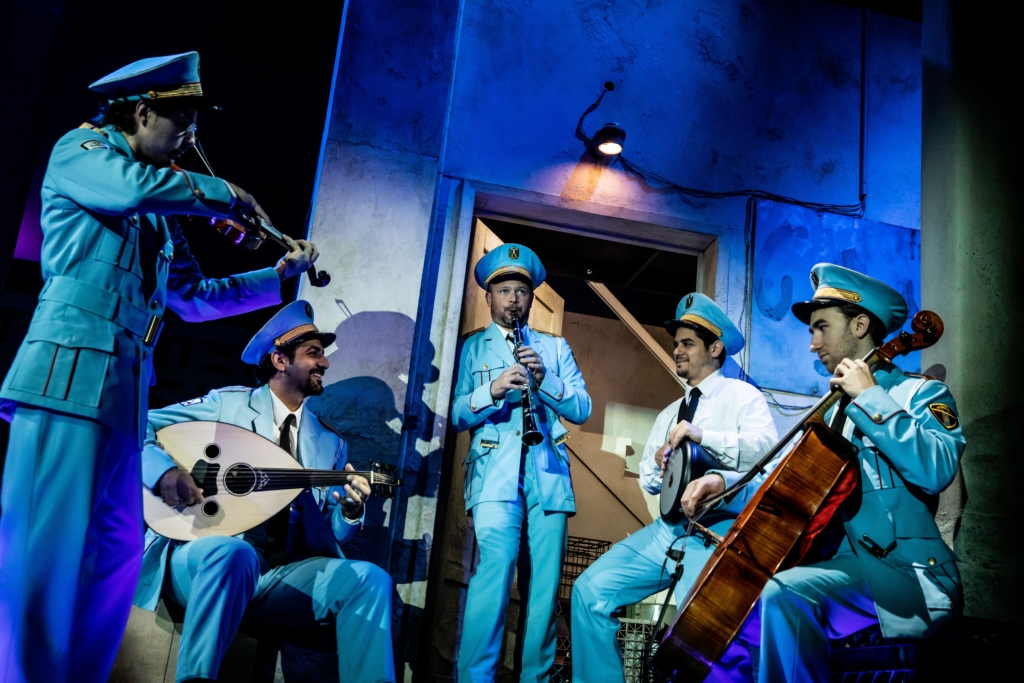“Not break the ice; you melt the ice. You melt yourself and soon you’re all one puddle.” The lead-in lyrics from “Haled’s Song About Love”, the feature number performed by Joe Joseph’s character, Haled, in The Band’s Visit. TheatreBloom Founder Amanda Gunther sits down with Joe Joseph and ‘melts the ice’ in a quick conversation about his experience on tour with the production and why he’s excited for it to come to Charm City.
Thank you so much for giving us a bit of your time today; we really appreciate it; let’s jump right in as the show will be in Baltimore in just under a month! Tell us how you got involved with The Band’s Visit. What was the draw for you to want to be a part of it?

Joe Joseph: I had first heard about The Band’s Visit when I was working out of town, and by out of town I mean out of New York. I was curious as I read the list of characters and who they had to cast. There were all these Middle Eastern men that had simple descriptions, and the story sounded sort of obscure. I was sort of fascinated by it. I was working out of town, and I kind of kept my eye on it. I was familiar with it, but I didn’t have the chance to see it until it was in previews. But when I saw it, I think I was as touched, and moved, and blown away by it in the same way that a lot of other people were. I also saw that there was a place for me in the show. I always kept tabs on it while I was living and working in New York. It’s a pretty tight show, eventually there was an opportunity to join the company there in New York. I put all my chips on that, did all the work I had to do, and that ended up being my first Broadway show.
Congratulations on The Band’s Visit being your first Broadway show! What has it been like to be on the road with a show that is maybe a little different from what most people expect when they think of a musical touring its way around the country?
Joe: Thank you! And I think it’s exciting. The Band’s Visit is, like you acknowledged, not similar to other musicals. The difference is in tone and style, and also in its great sense of empathy. It’s not a sentimental narrative, it’s not a series of morals being delivered to the audience. It’s not entertainment for adult children. It’s a story about souls. It’s a story about simple people. It’s a story about unexceptional lives.
When you said that you saw that there was a place for you in it, is that because you felt that you identified with a particular character, or the concept of the show as a whole? Or was it more of a— “hey, that’s my wheelhouse, hey, that’s my heritage?” What was it that made you say there’s something for me in that show?
Joe: I think it’s all of those things. As a show and as an aesthetic piece, I was completely taken by it. But more than that, when I saw Tony Shalhoub (original Broadway cast actor of Tewfiq) on stage, I had this odd experience of seeing my grandfather in a blue suit. I felt this deep pride for a lot of people, not only for the actors in the show but for the story itself. It was a story about people in the Middle East of who have souls. They have wants; they lose things; they love people and they love music. Those are universal themes that a lot of people can relate to.
What does it mean for you to be able to take this show all around the country?
Joe: The thing that’s exceptionable about being able to bring the show around the country is that Broadway and New York theatre is limited inherently by its proximity to Broadway. It’s a square in the middle of New York City that defines a certain type of commercial entertainment. It’s really exciting in the case of The Band’s Visit because its story is so universal; a lot of people can relate to it, people who otherwise wouldn’t think that they have anything to do with this part of the world or the people from this part of the world. They realize that the story of The Band’s Visit is very human. It’s a small town, big town story. It’s really about souls. I think it’s really exciting that we get to bring a story that I was touched by in New York all over the country and that because of that, so many people get to engage with it.
Everybody has dreams, everybody has struggling relationships. I think the best thing about The Band’s Visit, and a lot of this comes from the tone and style that was developed by our director (David Cromer), is that it doesn’t ever really preach to you. It doesn’t ever really say that everything is going to be okay. There is a dark end to existence. I think The Band’s Visit is 100% okay with facing that down. I think it’s that startling capacity that the show has to do that. It takes a lot of people, who wouldn’t otherwise be interested in a show like this, by surprise. It allows the show to occupy a place in their heart, but even deeper than that, it gets into your soul. By the end of the show, you almost realize how much of yourself you’ve allowed into these characters and how much of them you’ve allowed into your heart. And that’s the show. I think the best response we can get is when people say, “I didn’t want it to end.” They want to know more; that’s a good thing to want. But I think it’s special in that aspect that the show is withholding. It doesn’t feel the need to spell anything out or create narratives and arcs out of people’s lives. In real life, people don’t change. People are, to a certain extent, set in their ways, but that doesn’t mean that their experiences aren’t interesting. The show’s resistance to create those arcs and those stories for the audience’s enjoyment and for their feeling of satisfaction, I think is greatly empathetic. And it is a trend I would love to see developed in the musical theatre world.

You were cast as Haled; was that the role you were looking for when you went out for the show? Or was that what opened up when you came into the company?
Joe: It was my Broadway debut; I was hired as an understudy. That was the first role that I ended up going on for. But in a lot of ways it was ultimately the one that I was most interested in, in terms of touring, for a number of reasons.
Haled is the character who has all of the fun “Chet Baker” lines, yes? Do you have funny, silly pickup lines like Haled does? Do you relate to him in that way? What is your connection to Haled?
Joe: Yes, he’s the one with the Chet Baker lines. There are a lot of things about Haled that I find admirable and entertaining. David Yazbek (music and lyrics) once said that he considers Haled to be the soul of the show. I’m always interested in those characters because sometimes they hold something that the audience can’t quite recognize, but they go along with them without questioning. I think Telephone Guy (Mike Cefalo, touring) is another one that people feel deeply for this character. Haled is unlike any other character in the show because he’s unburdened. He’s not weighed down by loss. He’s not apprehensive to make a new connection. He’s open to everything.
I think the beauty of his approach is that, while he is very young— and I think he’s exerting effort to make his way in a strange place— he understands something simple and intrinsic about human connections. It’s really as simple as looking at someone’s eyes or touching their hand and feeling whether or not you have that kindred energy. That’s what we do as actors. Above that, I think for Haled it’s just not that serious. But that’s being said, he’s very young. He’s not yet really had to deal with a lot of the experiences that some of the adult characters in the show have had to deal with. He’s not weighed down by those feelings. Maintaining that feeling of just wanting to connect and wanting to open your heart, that is a fun challenge to have. It’s fun to be able to wear one pair of pants the entire show: literally.
Are you of that young, not-yet-weighed-down variety that you’ve just attributed to Haled?
Joe: Oh absolutely not. I am the most analytical sort of perpetually crazed being; it’s a wonderful challenge for me to take that side off and to have a cooler, simpler exterior. You realize, as an actor, that you possess multiple modes of being. When I first saw the show, I saw that part and thought, “Wow. David Yazbek wrote a song that I can sing.” It all just seemed to line up. The challenge of being Haled is a challenge that I am happy to undertake. But I’m 30. I’m a little bit older than what I think Haled is; none of the character’s have direct or distinctive ages. The Band’s Visit for Haled is sort of a joyride. It’s the one last train, one last night, before he has to head home to what he perceives to be as the end of one aspect of his life. He doesn’t see it as a new beginning.
Haled is also the catalyst, in a sense, that gets this whole story underway; he’s the guy that mixes up the tickets at the beginning of the show…landing them in Bet Hatikva instead of Petah Tikvah, right?
Joe: He is. But I have to say— it’s really not my fault! It’s actually Tewfiq’s fault. He should know better than to send Haled to do such an important task.
Indeed! Do you, Joe Joseph, have any delightful blunders— or happy accidents like Haled does with this ticket mix-up?
Joe: Oh gosh. I’m trying to think; I’m usually pretty coordinated. I’m trying to think of any transportation mishaps and thankfully none immediately come to mind!
That’s probably a good thing! You did talk about some of the challenges that you’ve had playing Haled; what is the moment in the show that comes to mind as the moment that speaks to you as a performer?
Joe: There’s a sequence right before Haled’s song, it follows Papi’s song about the ocean. It’s this wonderful contrast that Yazbek wanted to make where Papi’s song is the musical equivalent of a nervous breakdown and an explosion. And my song is smooth as water; it’s simple and its advice. There is this moment, and honestly I cribbed this from Ari’el Stachel, who played the role on Broadway, the most important thing about the song to me is that it not feel like a recitation or a delivery of some advice like “pick yourself up, it’s fine.” It’s realizing in this young man, this challenge that he has, and really wanting to help him.
There’s this moment where Adam Gabai (playing Papi), who is just the best scene partner I could have asked for and one of the best scene partner’s I’ve ever had, he finishes his song in this state of pure defeat. He sits on stage and we hear the ocean as the audience, we hear what he hears over the sound system; sometimes people laugh and he sits there, but his dejection is very powerful. I see in that moment that it’s not as simple as “everything will be fine, it will all be good.” It’s really about Haled wanting to say to him, “you have this within you to help yourself, and I’m going to help you get there.” And it’s the idea of having this great sense of empathy because otherwise my character can really come across as a bit of a lout, or just a charming, naïve kind of fool. But his despair to connect with people is quite genuine, whether he recognizes it or not. The satisfying part of being an actor in musical theatre is using a song to tell a story. And I get to do that in that moment.
We’ve talked about several different things that make this musical unique, one of which is that it’s written and cast primarily with persons of color, specifically those of the Middle East; what is it like to represent that category of individuals on tour with this show?
Joe: Our cast is a beautiful, cross-cultural exchange of actors from Israel, from the Middle East, from America, Arab Americans, and also people not from the Middle East, American Jews, and a number of other people that we consider a part of our cast, our company, our tech team, all of it. I think we are all united in wanting to believe that the future of the world and the progressive future of humankind is not about sectarian violence, tribalism, or these political identities. Or that any of these groups of identities should be marked or defined by conflict. I think that the rewarding thing about The Band’s Visit is that the story is not political. It really is about these people, about their souls, and about their human experience. It’s an incredible step forward for a group that is traditionally defined otherwise.
In the theatre community, in the end its representative of the nation at large, but we have the opportunity to move a bit faster than other forms of entertainment and respond to what we consider to be the important demands of a progressive society. I think Hamilton is an incredible example of an opportunity for so many young men and women of color to have a dignified job in which they are not asked to do the things that are typical of the entertainment defined by that minority experience, which has largely been determined by white folks. It’s an honor to be a part of a show that has that kind of integrity. But I also think we all consider it our responsibility to maintain a sense of authenticity in acknowledging that.
I’m a young Lebanese Arab-American guy. I’m not Egyptian. But I consider it my responsibility to do as much work as I can to honor Egyptian culture and to honor the Egyptian experience. We can sit here and say what we’re doing is important, but if its not actually representing people who are part of the story, then it’s nothing other than hot air. It’s important to remember, above all else, that it’s easy to pat ourselves on the back, but the impact of Arabs and Arab-Americans in this country is vast. Anyone who wants to learn about it can do as much research as they want, but we are here, and we’ve been here for years. The impact that we’ve been able to make in the American theatre— David Yazbek is one of those people. Itamar Moses (book, The Band’s Visit) is one of those people. They are not the only ones. But this is the first time in a Broadway musical where you’re going to see an oud (a short-necked, lute-type, pear-shaped stringed instrument) on stage. And you’re going to see a riq, which a tambourine that I play on stage; there are some things that you’ve never seen before that are in this show.

And it’s surprisingly simple; I think that’s part of the show’s charm, isn’t it?
Joe: It’s deceptively simple. The pieces that are there are actually quite spare. The book itself is just over 50 pages. But I think the most exceptional thing about the show is that as simple as it is, it has this depth that other musicals could never hope to achieve. I think of it like an iceberg. You see and experience and hear only so much over the course of just over 90 minutes. But where the show is able to go emotionally is so much deeper than a lot of other shows. It strikes a deep emotional chord. It also happens to be tied together with the work of our creative team. It was a really wonderful combination of folks and incredible talents who have made a show of great aesthetic unity. And that hypnotic quality that the show has when we do our jobs right is the extra level that allows the story to be told but in a way that feels like you’re being hypnotized.
What has being a part of The Band’s Visit taught you about yourself? What is your personal takeaway here?
Joe: There are a lot of things that answer that question. This is the longest I’ve ever done one show. This is the longest I’ve ever performed a single piece. It’s the longest I’ve ever worked on one show and it’s really exciting when you’re a part of something like that and you don’t find yourself tired of it but perhaps even more interested in it. I’ve been a part of some musicals where after a while there are some numbers that I could absolutely do without. This isn’t one of them. It has a unique sonic quality to it. I consider it my responsibility to preserve the incredible work that the Tony-winning company of The Band’s Visit, that I got to be a part of, made real. The work they did was astounding and the work they did was honest and human and empathetic. It was touching and exciting and funny. That’s the best thing about The Band’s Visit, as important as it feels, and my dad said this when he first saw it, “it’s just so funny.” There’s a silliness to the whole thing that levitates it and disarms the feeling of pretention that some people might have about something that is so still and so laidback. I think it’s the experience of learning how to perpetually invest yourself in the material. When you’re asked to do the same thing— we’re in commercial theatre, we’re asked to preserve a product. It’s our job to exist within the world and bring our whole self to the show eight times a week, in a different city constantly. It’s about investing yourself and that’s more than just trying something new. It’s looking at different ways to relate to something, to approach a situation. As a learning experience, I don’t think I’ve ever had anything as comprehensive as this.
You mentioned back there somewhere that you play a riq. Can you explain a bit more on that? Did you come in knowing how to play musical instruments or are you learning on the fly?
Joe: A riq, yes, it’s like a combination between a tambourine and a hand drum. I have always picked up instruments on the fly. I was a percussionist for a while when I was younger. The riq is part of the concert at the end of the show. On Broadway it was a prop. I thought, “this is my part now, I can learn this. I think I can do this!” I was in Cairo, I tracked one down that I liked, and I spent the time to learn how to play it. I wanted to be a part of the band. I thought it was something I could do to give myself something to look forward to and it has been exactly that! Getting to play at the end of the show in the concert with the band is one of my absolute favorite parts of the show. The audience response to the musicians is inspiring. They leap to their feet; it’s really a thrill. It’s so rousing and very electric.
What is it you are hoping people will take away from coming to see The Band’s Visit. Why do you want them to come see it?
Joe: The Band’s Visit is a story about music but it’s also a story about what we all long for, the things that we lose, the things that we love, and the things that we hold onto. I think that if you want to be put in touch with the deepest parts of your soul and not just be entertained, and you’re willing to lean in and experience a quiet, simple, powerful story; you will not be disappointed.
The Band’s Visit visits Baltimore from March 17, 2020 through March 22, 2020 at Baltimore’s Hippodrome Theatre in the France-Merrick Performing Arts Center— 12 N. Eutaw Street in the Bromo Seltzer Arts District of Baltimore, MD. For tickets call the box office at (410) 752-7444 or purchase them purchase them online.

